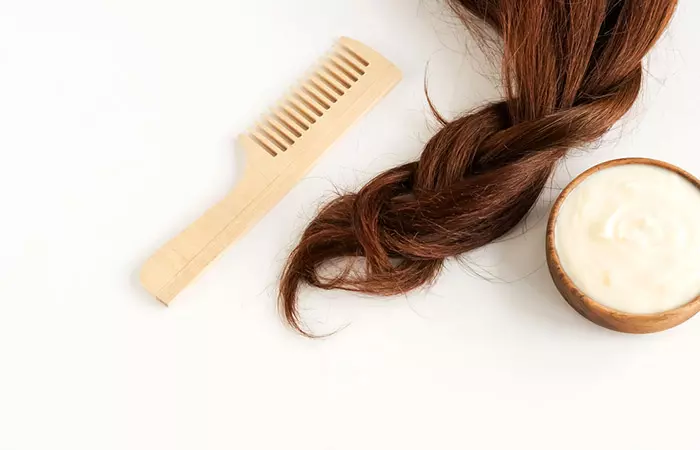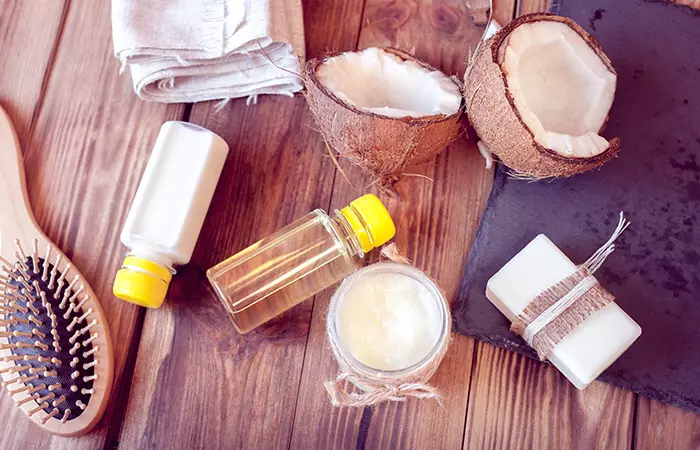Before we head to that, let us learn how these masks help care for your hair. Besides keeping your hair moisturized, they offer essential vitamins, minerals, fats, and proteins your hair. In this article, we will answer all your queries and delve deeper into how these masks can help treat different conditions like dandruff, hair thinning, and many more. Keep scrolling. You can use a hair mask as frequently as needed for hair repair and hair nourishment. For best results, we recommend using a hair mask at least once a week. While you can find these hair products at any drugstore, you can create your own mask at home that perfectly suits your requirements. Such a hair mask also offers certain benefits.
Benefits Of A Hair Mask
1. Does Not Weigh Your Hair Down
Hair masks contain several natural oils and other rich ingredients but are not heavy. These products are specially designed to condition your shaft without leaving any residue. A hair mask smoothens your hair and boosts its shine.
2. Replenishes Dry Hair Strands
A hair mask can rehydrate your dry tresses. It gives your locks a healthy dose of moisture and acts as a conditioner. It also offers electrolytesi Electrically charged minerals that play an important role in maintaining the water and pH levels in the body. , minerals, and vitamins to frizzy hair and seals hydration.
3. Helps Maintain Hair Color
Hair color could be damaging. It can strip hair moisture and leave it feeling rough and dry. You can prevent this by applying a hair mask to color-treated hair at least once a week. This will allow your shafts to reabsorb the moisture and makes your hair look fresh and fabulous.
4. Repairs Hair
The nourishing ingredients of a hair mask offer your shaft the required nutrients to strengthen itself. The effectiveness of a hair mask is largely determined by the ingredients used to make it. Let us discuss these important ingredients in the next segment.
What Ingredients Should You Include In Your Hair Mask?
1. Almond Oil
A hair mask should nourish the hair roots as well as the hair tips, and almond oil can help achieve this. It contains emollientsi Ingredients used in skincare products to hydrate. soften, and soothe dry, rough, and cracked skin. (1). These could rejuvenate the scalp. Almond oil also has anti-inflammatory properties (1). The oil may help treat dandruff, dry scales, and other forms of scalp inflammation.
2. Banana Seeds
Banana seeds contain various antioxidants (2). These fight against the effects of free radicals and may also slow down hair graying. However, the seeds are not recommended for those with latexi A white substance found in various plants that may cause an allergic reaction in some individuals. allergies,
3. Coconut Oil
Coconut oil is rich in proteins that can moisturize, strengthen, and replenish your hair shaft. It hydrates hair and protects the scalp by suppressing various inflammatory responses. It also enhances the scalp barrier function and protects the scalp from outside aggressors. It even may help treat scalp eczema or atopic dermatitisi A chronic skin condition characterized by dry, red, and itchy skin due to genetic mutations or exposure to allergens. (3)
4. Yogurt
Many individuals have reported positive results after applying a hair mask made of yogurt. The proteins in yogurt may soften and strengthen hair. Yogurt may also fight dandruff. However, more research is warranted in this regard. You may also include other ingredients like honey, lavender oil, sandalwood oil, olive oil, mayonnaise, jojoba oil, avocado oil, mango butter, keratin, shea butter, aloe vera, and argan oil in your hair mask. These ingredients also possess various moisturizing and anti-inflammatory properties.
How Do You Make A Hair Mask For Damaged Hair?
Opt for ingredients rich in omega-3 fatty acids and antioxidants. These protect your hair against free radicals, strengthen your hair strands, and boost hair shine. You Will Need
1 tablespoon of honey 1 tablespoon of almond oil 1 egg Half an avocado
How To Make Bhavna, a business analyst, makeup lover, and blogger, shares her hair care routine to fight wavy, damaged, and frizzy hair. She applies a hair mask made of honey, mashed banana, eggs, and yogurt to repair her damaged hair. She states, “A simple hair mask can effectively reduce frizz. I use this homemade hair mask once a week and it works amazingly well for my hair (i).”
How Do You Make A Hair Mask For Dry, Dandruff-Laden Hair?
While one does not cause the other, people often experience dry hair and an onslaught of dandruff together. A hydrating hair mask will moisturize your hair shafts and exfoliate your scalp, helping eliminate dandruff. You Will Need
4 tablespoons of raw sugar 1 egg 1 tablespoon of honey 1 tablespoon of apple cider vinegar
How To Make You can double or triple the amount of the ingredients to match your hair length. The sugar and vinegar help exfoliate the scalp and get rid of sweat and sebum buildup. Massage the mask into the scalp for 5 minutes for the exfoliating action to take place.
How Do You Make A Hair Mask To Treat Thinning Hair?
Healthy fats and proteins are vital for hair growth and thickness. This mask contains ingredients rich in such nutrients. You Will Need
Half an avocado 1 egg 1 tablespoon of coconut oil ½ a teaspoon of honey
How To Make This mask will give your thin and limp hair the fullness that it needs by giving it a protein coat. These hair masks target specific issues and help treat them. While the ingredients used in a hair mask are key, you also must know the right method of application.
How Do You Apply A Hair Mask To Your Hair Strands?
To ensure the best results, keep the following pointers in mind.
Points To Keep In Mind When Using A Hair Mask
Wash your hair with warm water before applying a hair mask. Warm water will open the cuticles and allows them to absorb the moisture from the hair mask. Rinse out your mask with cold water. This will close the hair cuticles and seal in the moisture. Do not aggressively rub your hair with a towel, as it may cause static and further damage your strands. For optimum results, pick or create a hair mask that specifically suits your hair type and needs.
How Often Should You Use A Hair Mask?
The frequency of using hair masks depends on your hair type.
Damaged Hair: Twice to thrice a week. Nutrient-rich hair masks can help renew your hair. You may then reduce the frequency of use as your mane gets repaired. Dry Hair: Twice a week. This gives your dry hair an extra boost of hydration. Curly Hair: Once a week. As curly hair is not washed regularly, using a mask more than once a week may lead to product buildup. Thick Hair: Once to twice a week. If your thick hair is dried or damaged, you may use a mask twice a week. Otherwise, once should suffice. Fine Hair: Once a week. This ensures your hair does not get weighed down. Greasy Hair: Once a week. This is to provide nourishment to your hair without causing any buildup. Healthy Hair: Once a week. Even healthy hair can benefit from an extra nutrient boost once a week.
Can you leave a hair mask on too long? Hair masks smoothen the hair, rehydrate the hair, help maintain hair color, and effectively repair the hair. Yogurt, banana seeds, and coconut oil can be used to make a hair mask. Applying the hair mask on washed hair with warm water improves its effectiveness. Try including any of the masks mentioned above in your hair care regimen for healthy hair. Leaving a hair mask on for too long does not have any added benefits. Therefore, it is safer to leave it on your hair only for the recommended duration. Can I use a hair mask as a leave-in conditioner? Using a hair mask as a leave-in conditioner may not yield any benefits. Consult a dermatologist before doing so. Can I use a hair mask daily? Using a hair mask daily is not recommended. You may use it once a week to reap its benefits.
Illustration: How To Use A Hair Mask + 4 Benefits Of Using It
Hair masks help rejuvenate dry and damaged hair. Check out the video below to learn how to apply a hair mask perfectly for glossy, strong, and nourished locks.
The uses and properties of almond oil https://www.sciencedirect.com/science/article/abs/pii/S1744388109000772?via%3Dihub Antidiarrheal, Antioxidant and Antimicrobial Activities of the Musa sapientum Seed https://pubmed.ncbi.nlm.nih.gov/23407989/ In vitro anti-inflammatory and skin protective properties of Virgin coconut oil https://www.sciencedirect.com/science/article/pii/S2225411017300871?via%3Dihub












